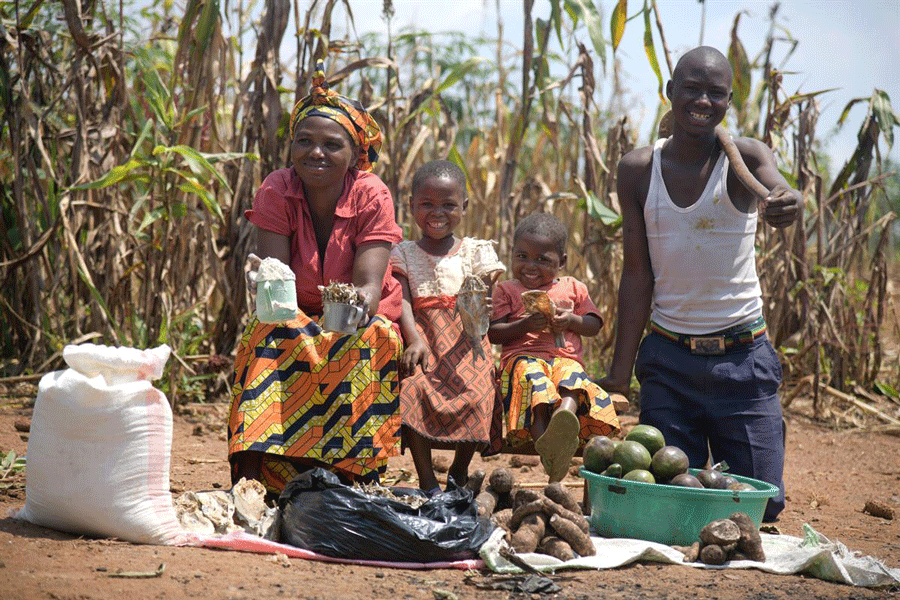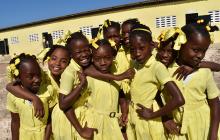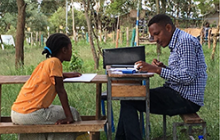From East Africa to the Caribbean: Finding Solutions to Research Challenges During COVID-19

Credit: AVSI Foundation
Conducting research and providing technical assistance in developing countries is always challenging and unpredictable. To be successful, experts must understand local context, including language and culture. The nature of operating on the ground means they also might encounter economic, social, and political instability that can affect ongoing work. While experts at AIR frequently adapt to changing conditions, the global coronavirus pandemic ushered in a new wave of challenges, including lockdowns that slowed projects typically conducted in person.
Despite the disruptions, and against great odds, AIR’s international development initiatives have progressed. Experts from AIR and local staff in the field learned lessons in 2020 about creative solutions to research problems that they will carry with them when encountering future challenges. Here, they share those takeaways.
1. Understand local technology and use it creatively.
Adaptations to Build Resilient Communities
In Uganda, AIR works with AVSI Foundation and Trickle Up as the research and learning partner implementing Graduating to Resilience, a USAID activity aimed at improving the livelihoods, food security, and resilience of more than 13,000 extremely low-income refugee and host community households.
One focus of AIR’s work is leading context monitoring and scenario planning efforts to understand how changes in the environment, policies, market dynamics, and other external forces may affect the activity's interventions. When the government of Uganda responded to the coronavirus pandemic with a national lockdown in late March, the activity halted its fieldwork to comply with orders and protect the health of study participants and staff.
“Our mindset changed from ‘there is nothing we can do’ to ‘we should try to do something,’ and then the monitoring, evaluation, research and learning team suggested a plan for remote data collection using cell phones,” said AIR research and learning facilitator Andie Procopio.
To gauge the feasibility of this approach, the team conducted a survey to understand cell phone ownership and accessibility among activity participants. They found that 80 percent of participants owned a cell phone and about 99 percent had access to one. The team negotiated a plan with a private sector partner to offer low-cost phone loans to participants who needed them. This solution offered not only a way for researchers to continue collecting data, but also provided other benefits, including increased capacity for information sharing and mobile banking capabilities for participants.
Reflections from a Community Trainer
With this solution in place, the team took steps to shift to remote data collection, including:
- Increasing the available minutes and internet data in field staff’s mobile phone plans in order to collect the data;
- Making the data collection tools shorter and easier to administer as phone calls; and
- Collecting data from a representative sample of the group, rather than all participants.
The team also used conference calls to conduct coaching sessions that were previously held in groups of 25 people. When they discovered network coverage was spotty, staff began scheduling calls far enough in advance to provide participants time to arrange to be in a location with the best coverage during the call.
This relatively low-tech approach met the needs of the activity participants, who have benefitted from ongoing connection with their trusted coaches and community-based trainers, according to Procopio.
2. Leverage existing resources—don’t start from scratch.
Through the Latin America and Caribbean Reads Capacity Program, AIR collaborates with RedLEI, a regional consortium of university partners, to improve the quality of early grade literacy instruction in Central America and the Caribbean. When local school systems transitioned to virtual learning, the team saw an opportunity to provide evidence-based guidance to teachers, most of whom were teaching virtually for the first time.
“We wanted to make this transition not such an overwhelming task for teachers,” said AIR principal researcher Rebecca Stone, who led the creation and distribution of the Emergency Remote Teaching webinars, a series of six live sessions that reached more than 500 educators across the region. The sessions focused on curriculum adaptation, communication and relationships, assessment strategies, and inclusivity, and provided opportunities for hands-on experience with web-based teaching tools.
“We weren’t starting from scratch,” Stone said, adding, “Our colleagues in South Africa were creating a similar series for a network of African institutions. We decided to collaborate. We brought the outline of their first four sessions to our local team and asked, ‘What else is needed? How do we adapt this for our context?’ This would have taken us four months longer if we were developing all of the outlines, PowerPoints, and everything from the beginning.”
The team also drew much of their material from existing research on best practices for remote teaching, such as pausing for student interaction after every 7-10 minutes of instruction. Project associate Ana Gonzalez explained that the team made special efforts to model evidence-based virtual learning principles throughout each of the webinars.
3. Create contingency plans—especially when it comes to the budget.
Having dealt with security threats, electricity and broadband internet outages, and other unpredictable situations, AIR’s Reading for Ethiopia’s Achievement Developed Monitoring and Evaluation team is familiar with scenario-based planning and quick decision-making. When the COVID-19 pandemic brought their Teachers’ English Competency Assessment to a halt, they strategized to ensure they could still collect data on the verbal and written English abilities of teachers, a study ultimately aimed at improving the quality of teacher training in Ethiopia.
Launched as a follow-up to the successful Mother Tongue Teacher Competency Assessment, the English assessment was designed to test 490 teachers in one day across five regions in early August. In response to the pandemic, several regional governments instituted mandatory two-week quarantines, restricted travel, closed schools, and took other measures to protect public health. However, the team was determined to deliver on the survey and decided to divide the assessment into three phases, each focused on a smaller grouping of regions and teachers.
 To conduct their work, team members relied heavily on collaboration with Ethiopia’s regional education bureaus, longtime partners with whom they had established significant trust. In one region with a mandatory quarantine period, the bureau helped the team secure rapid COVID-19 tests that provided “VIP status” and negated the quarantine requirement, an agreement that fell into place just a week before the assessment was set to begin.
To conduct their work, team members relied heavily on collaboration with Ethiopia’s regional education bureaus, longtime partners with whom they had established significant trust. In one region with a mandatory quarantine period, the bureau helped the team secure rapid COVID-19 tests that provided “VIP status” and negated the quarantine requirement, an agreement that fell into place just a week before the assessment was set to begin.
“In a week’s time, or even a day's time, things change,” according to Belen Mekonnen, the project’s deputy chief of party, who worked with her team to create countless contingency plans to ensure the assessments could be conducted safely. “We’ve had to overhaul the in-person assessment design to keep participants distanced. We’ve gone from one evaluation room to three or four in each location, hired many additional assessors, and purchased individual supplies and personal protective equipment for each participant. It is extremely budget intensive.”
The team’s dedication to planning paid off when they safely launched the assessment in early October, ultimately reaching 468 teachers—95.5 percent of those invited, representing 245 schools across diverse regions.
A Successful Pivot is about the People
A lesson that echoed across these three diverse projects is the importance of having a committed team, strong partnerships with local stakeholders, and good relationships with the individuals benefitting from and contributing to the programs or studies. While government policies, logistics, and technology may be obstacles to continuing fieldwork amid a pandemic, the people involved can make or break efforts to pivot.
“Our success can be attributed to not underestimating the ingenuity of our team and their dedication to making this work, operating with the understanding that failure was okay as long as we failed quickly and learned from it, and utilizing our local community of practice to share experiences,” Andie Procopio in Uganda said. “COVID-19 dealt us challenges, but it also strengthened our solidarity.”


